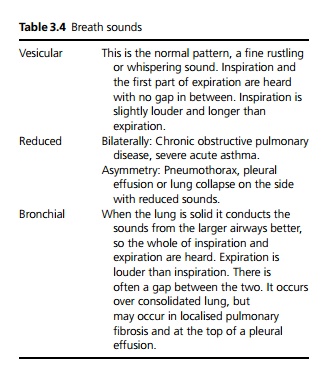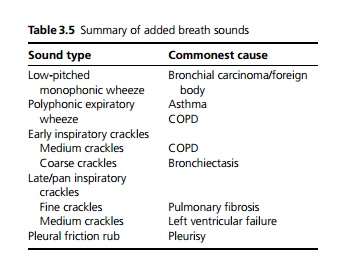Chapter: Medicine and surgery: Respiratory system
Breath sounds - Signs
Breath sounds
Normal breath sounds are caused by the turbulent flow of air through the
airways (not the alveoli). They are transmitted to the chest wall through the
lungs (see Table 3.4).

Added breath sounds
These are divided into wheezes from the airways, crackles, which come
from the large airways, the bronchioles and the alveoli, and friction rubs from
the pleura (see Table 3.5)

Wheezes are musical sounds caused by airway obstruction and are usually heard in
expiration.
·
A low-pitched monophonic wheeze
is caused by obstruction of a single large airway (below the trachea). It is
caused by bronchial carcinoma or inhaled foreign body, and is frequently
inspiratory.
·
A high-pitched expiratory wheeze,
often with a mixture of notes ‘polyphonic wheeze’ is caused by obstruction of
many smaller airways as occurs in asthma and chronic obstructive pulmonary
disease (COPD). However, these conditions may occur without wheeze, despite
severe obstruction.
Crackles/crepitations: Normally the airways do not collapse or obstruct on expiration, but they
may due to secretions and oedema or damage by either fibrosis or loss of
elasticity. The reopening of collapsed small airways and alveoli or the
presence of secretions in the larger air-ways cause inspiratory crackles. They
are differentiated by their timing and nature:
·
Early inspiratory crackles come
from the airways, where air reaches them first in inspiration. Late or
paninspiratory crackles come from the alveoli.
·
‘Fine crackles’ are usually
alveolar (late) and are often described as rubbing hair through fingers. They
are typical of pulmonary fibrosis or alveolar oedema.
·
Coarse crackles are wet,
low-pitched early inspiratory sounds due to airway secretions, often changed in
nature by coughing.
Pleural friction rub: A creaking sound in inspiration and expiration, localised over an area of pleural inflammation. Causes
include viral or bacterial pneumonia and pulmonary infarct/embolus.
Related Topics